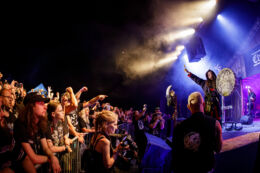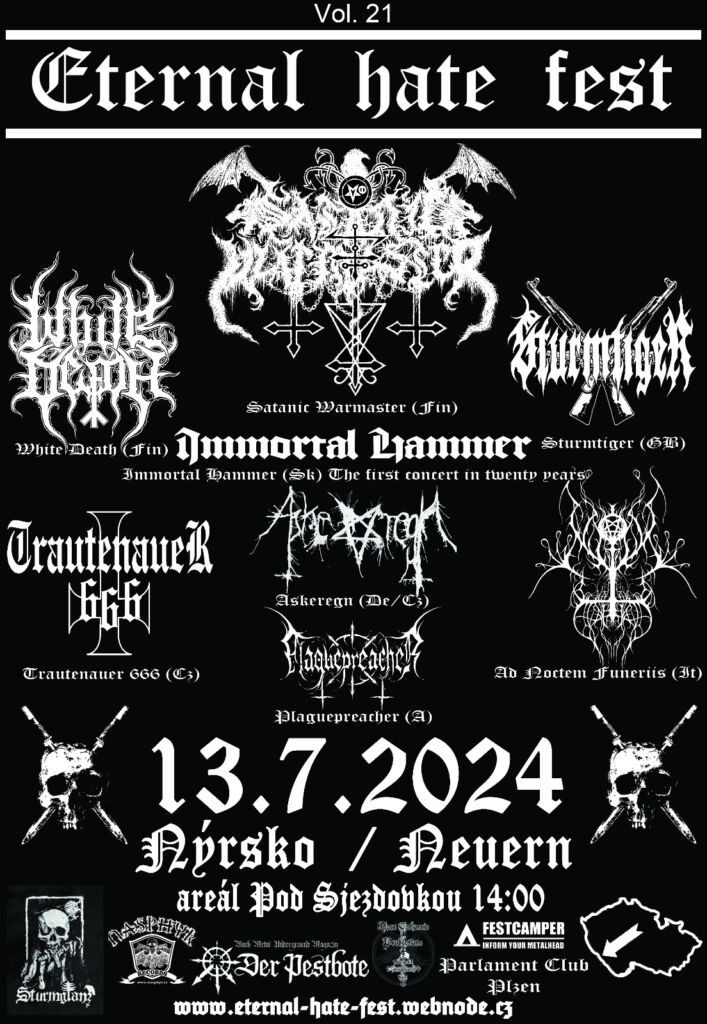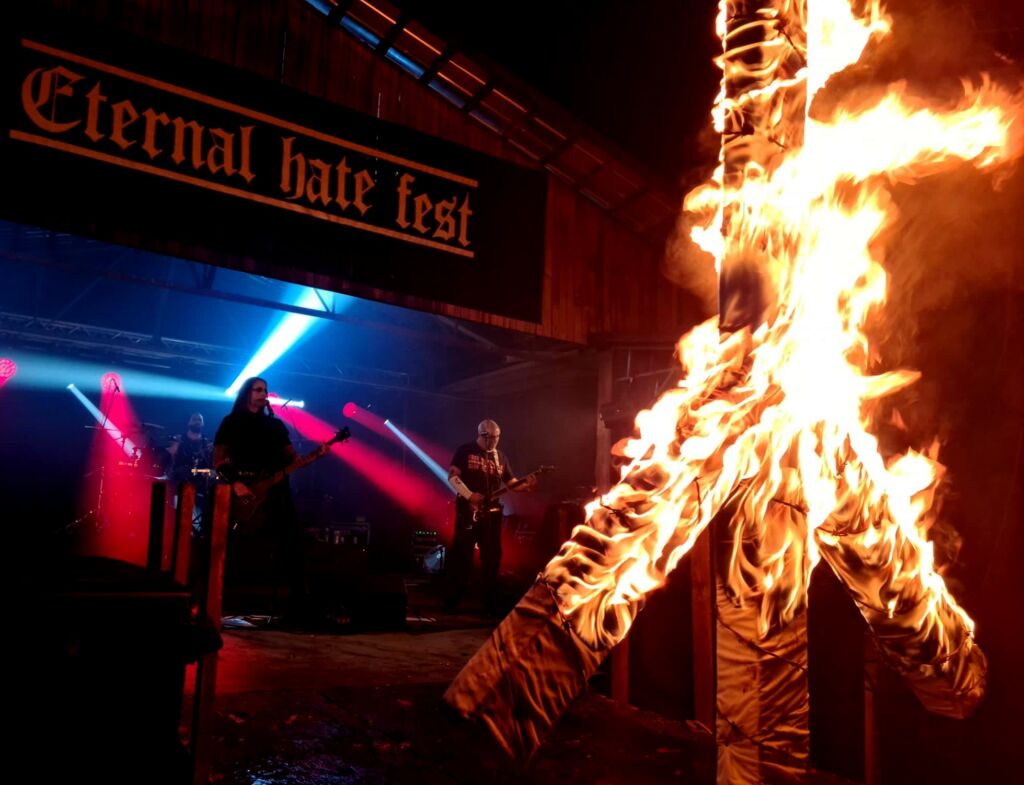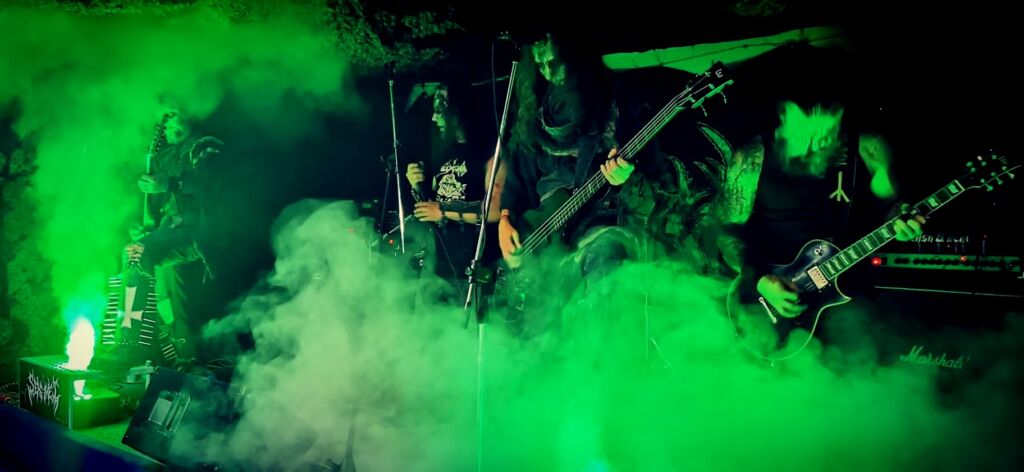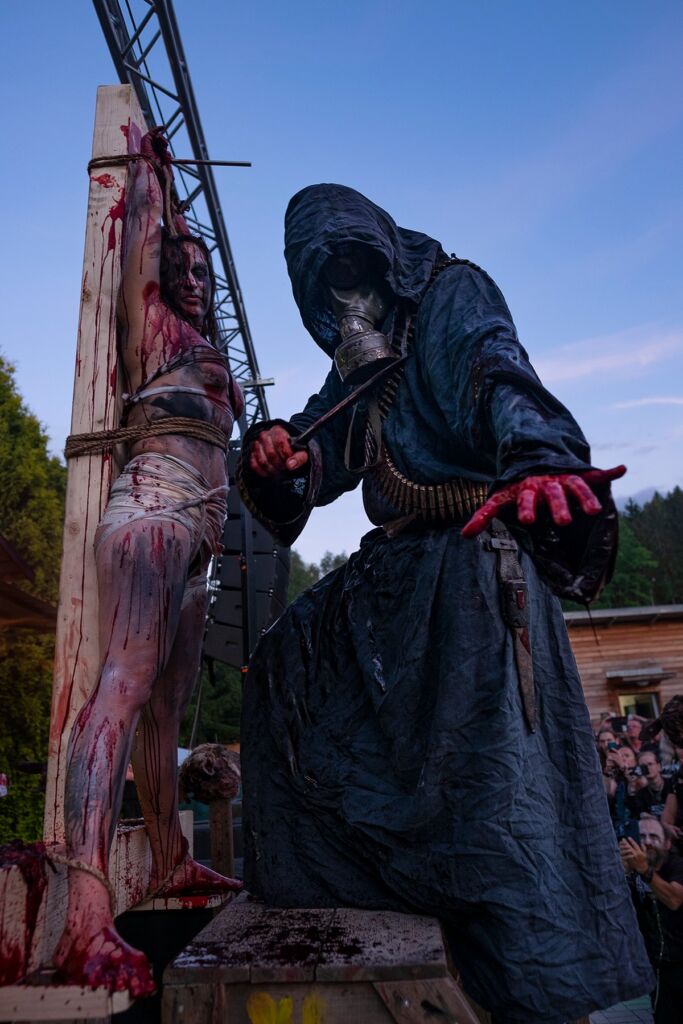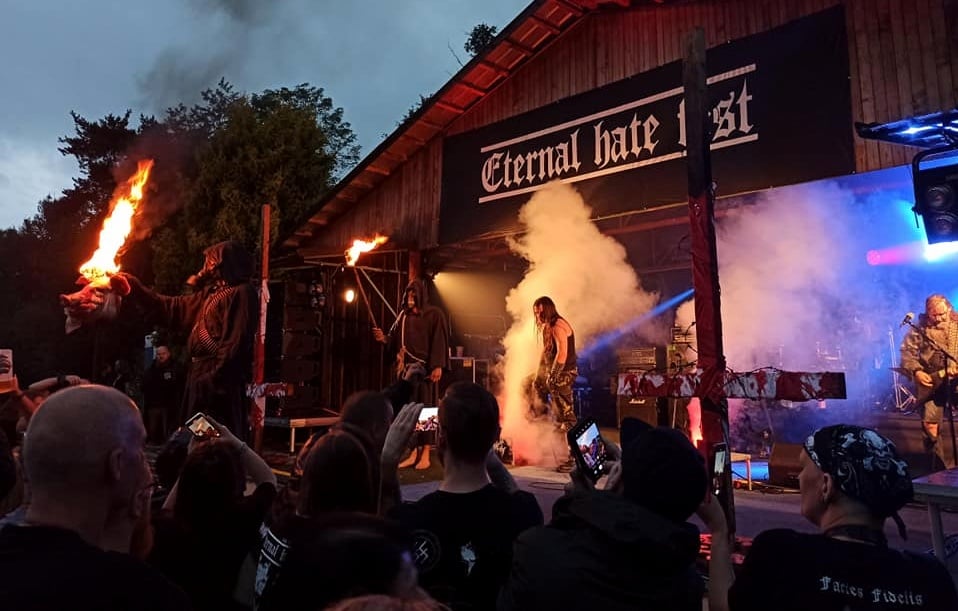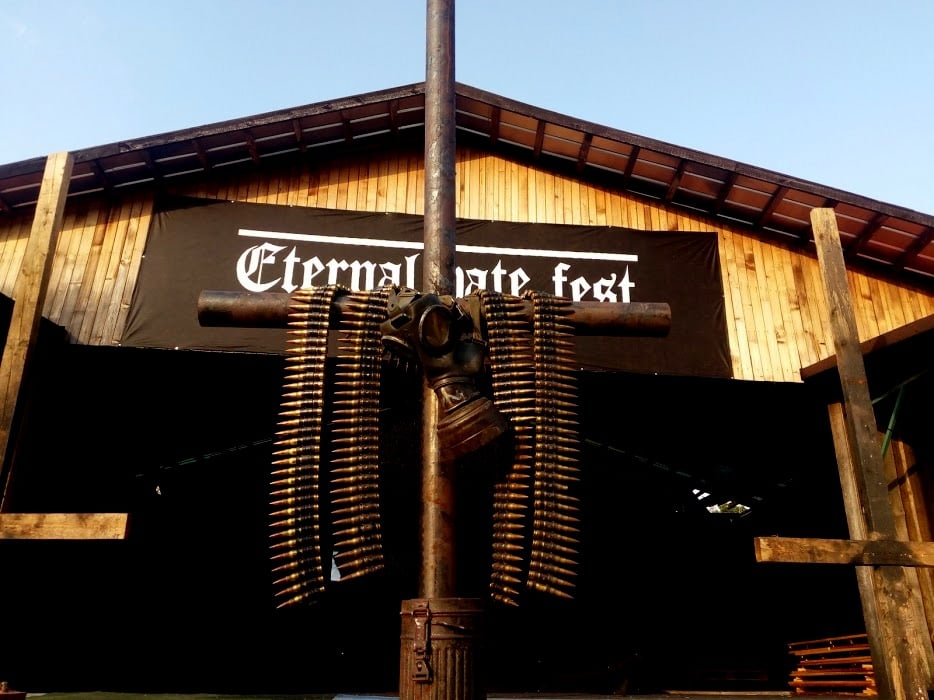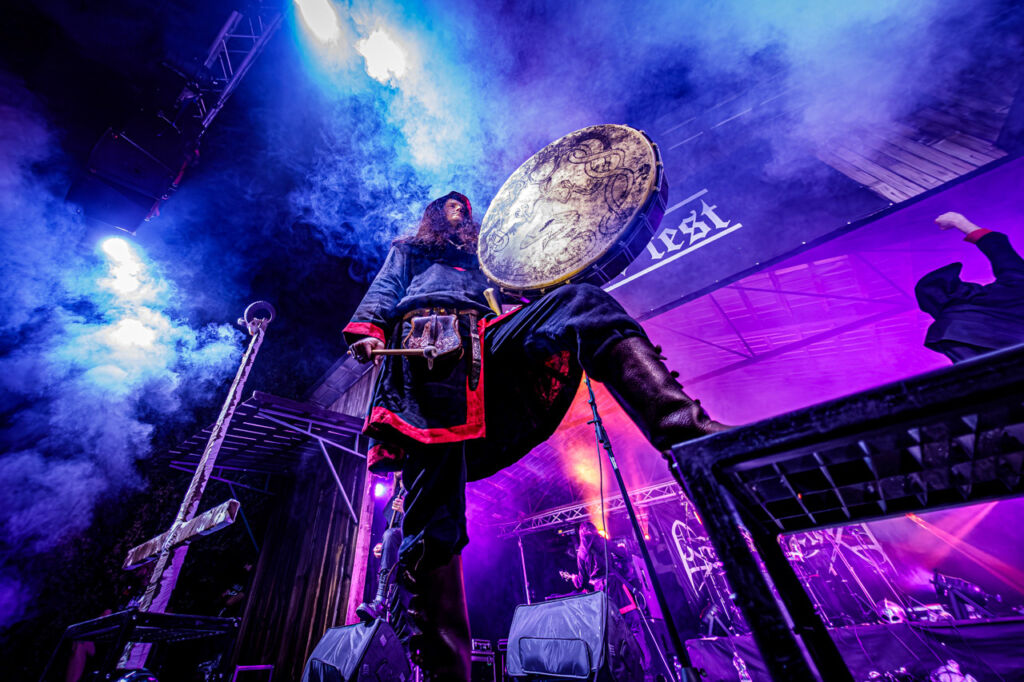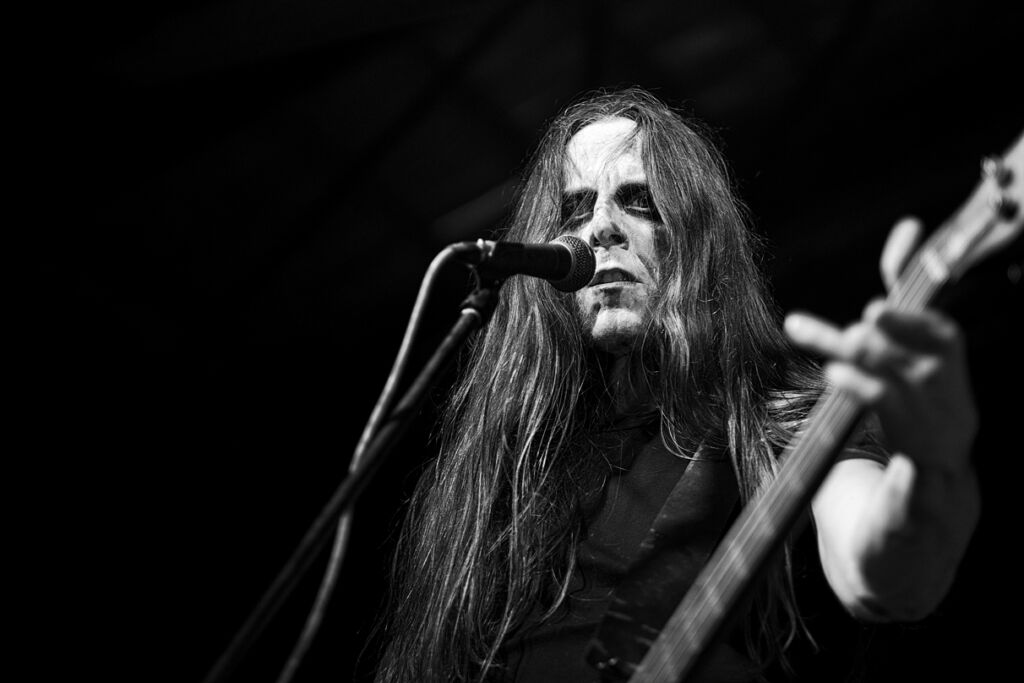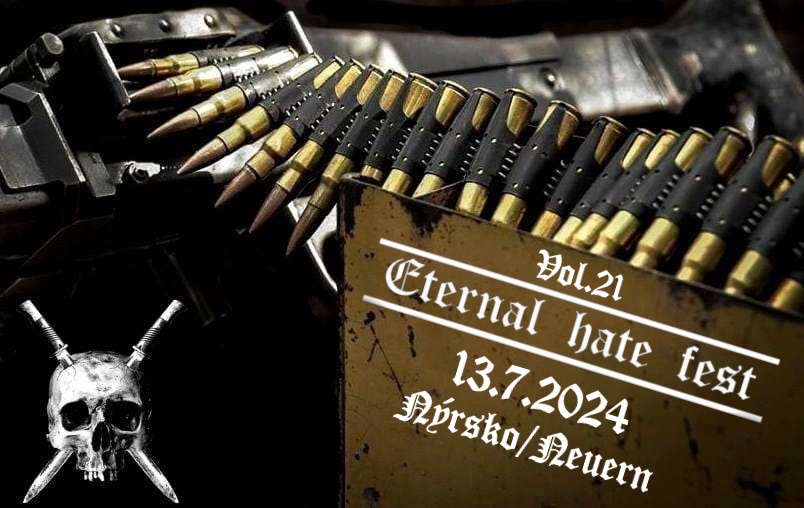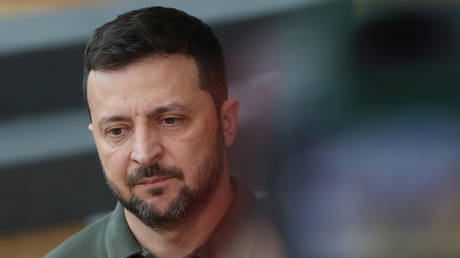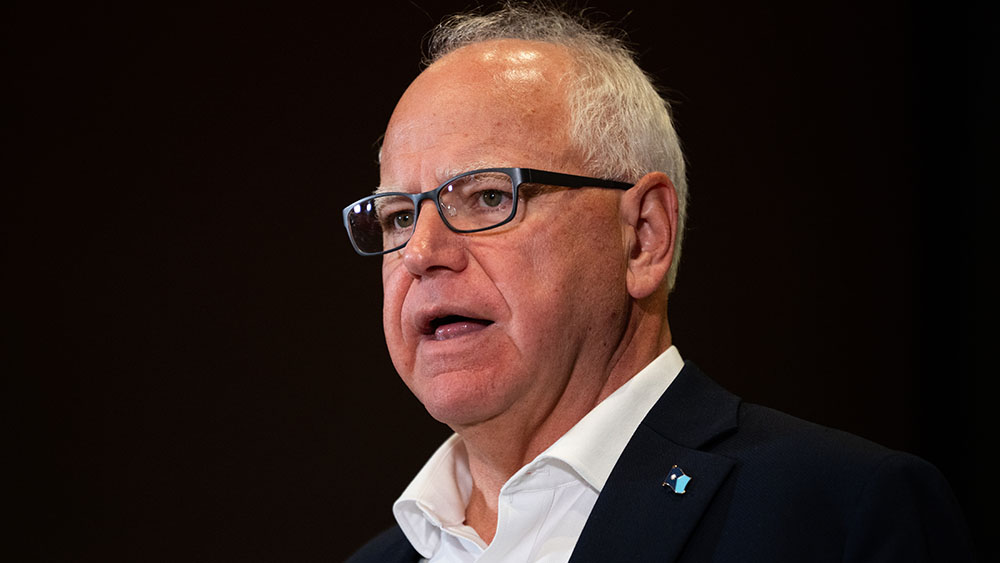Eternal Hate Fest: Black Metal without Political Correctness
3,393 words
In Europe there are very few black metal festivals that are genuinely free of censorship. In the Czech Republic there is one such festival, which is held in an attractive and dark natural location: Eternal Hate Fest, organized by Daniel Beherit Bílý. I always go to this festival even if it is far away from my home, as it is always worth it. I’ve seen some of the best concerts in my life there, such as the performance of Nokturnal Mortum and the Czech band Inferno in 2018. Both of these bands can create a literally magical atmosphere. This year’s festival will take place on July 13.
I consider Nokturnal Mortum to be the Pink Floyd of Black Metal and musically one of the best bands of the whole genre. Moreover, they are very innovative in the fight against censorship in black metal. They have their own Music Hall Store and hold their own festival of metal bands.
Inferno played a special set under a black sky full of stars on that night in 2018. Singer Adramelech opened his mouth and devoured everything alive as the band performed in nature, surrounded by deep, dark forests. There is a lot of sightseeing around Nýrsko and it is possible to combine visiting the festival with tourism. I hope that Daniel will continue to organize it for many more years.
In this interview with Daniel, we talked about Graveland, Nokturnal Mortum, Ad Hominem, the history of Nýrsko, the local sightseeing, concert advice, the festival’s problems with the police, and beer specials.
Ondrej Mann: Where has the festival gone from its first year to the present? Could you give us an assessment?
Daniel Beherit Bílý: The first Eternal Hate Fest (EHF) was held in 1998 in Starec u Kdyně. This one lasted for two days, and 32 bands played there. It was a real nightmare, and I still don’t understand how it went so well — at a time when there were not yet any mobile phones. The first problem came when I was picked up by the police on Friday morning, while I was preparing my stuff for the festival, and taken to the police station in Kdyně. There, I was interrogated by Chief Commander Konop himself. There was the obligatory lamp shone in my face and copies of the festival‘s posters, where all the names were translated into English. There were questions about why the festival had such a name, and why I was inviting bands with such horrible names, and the fact that such people were coming from all over the Czech Republic, as well as Satanists from Germany. I couldn’t believe my ears, but then it turned out that this had happened on the orders of the local priest. The Chief also threatened that if there was a single complaint from the locals, a strike team would be ready in Klatovy and Domažlice, and the festival would then be surrounded and cancelled without any compensation. Everything turned out well, however, and the locals even went there for sausage and beer.
The police continue to be interested in the festival to this day, and since our move to Nýrsko it has increased even more.
I started to organize EHF together with Martyrium Christi (I was their manager for 18 years, from the beginning until they broke up in 2012). The fest was mainly used for arranging gigs with other bands and after the breakup of MCH. I took over the whole event myself, which allowed me to change the concept of the event. First I moved it to Nýrsko (where I live) and I began inviting bands I wanted to see that didn’t play here often. The EHF started to gradually change until it settled into the form it has today. The shift is quite obvious: from a local event where only one foreign band played while the rest were Czech, it has become one where there are only one or two Czech bands playing there and the rest are from abroad. The attendance has also changed drastically. Nowadays, foreigners make up more than 90% of the audience.
OM: How do you explain that in the late 1980s and early 1990s a lot of small festivals were held in our country, such as Brutal Assault, while today there are huge festivals with tens of thousands of visitors, sponsors, and vendors? Yet, Eternal Hate Fest started as an underground festival and is still underground.
DB: Of the festivals that started in the 1990s, only Brutal Assault, and Obscene Extreme are professional. EHF came out of the deep underground and that’s where it will stay. I have absolutely no ambition or need to push it to a professional level: overpaying bands, inviting mainstream stars, holding the festival for many days, and eventually charging lesser-known bands to play here. Even the vendors who sell CDs and LPs here don’t pay for anything. I’m fine with a one-day event, since I do everything myself, so it’s easy to manage. I have lots of other activities and interests, not related to music at all, that I want to pursue even more. I will also try as much as possible to continue to maintain the standard of the festival as it currently stands. It’s been a long road to get there . . .
I’m not even going to move to a bigger location to accommodate more fans. This venue has its own unique atmosphere and charm. That’s why I try to stay in the underground as much as possible, and invite bands that I like and especially those which don’t usually play at all in the festivals around here.
OM: What would you recommend to underground Black Metal festival organizers? What is needed to organize such a festival?
DB: I would recommend that they have strong nerves, as well as enough free time and money to launch a bigger event. It also depends on what kind of bands they want to invite. If it’s just politically-correct Black Metal bands, fine, but if it’s something else, of course there’s the worry of various organizations such as antifa and so on.
OM: The advantage in terms of the antifa is that the festival is difficult to access. I think that if the festival were to be held close to Prague, the antifa would be more active and the participants would be harassed. Have antifa and similar groups in the past only caused online problems for the festival, or has there been doxxing, bullying of the organizers, and other such things?
DB: You’re probably right, but it isn’t a problem for a serious social justice warrior to travel a few kilometers, leave a carbon footprint, stand just outside the festival grounds, and try to persuade us of his truth.
The most harassment I have experienced occurred after the first Ad Hominem performance. That’s when I got a lot of hate mail and threats of physical violence, both to my girlfriend and my family. Nowadays it’s quiet, and from what I have seen there were only a couple of articles in Germany, where it was claimed that the festival is problematic and that such horrible bands are playing here, which are incompatible with modern European values.
OM: The cult band from Pilsen, Stiny Plamenu (SP), also played at the sixth edition of the festival. Are you planning to organize more of their performances in the future?
DB: Yes, SP used to play at the EHF. It was back when the festival was in Kdyni. Morbivod played in Nýrsk with Trollech and War For War. I’m a fan of SP, I have almost their entire discography in my collection. They are unmistakable and totally original. We’ll see what the sewer dirt brings and how we get along . . .
OM: What is the connection between Sekhmet and Eternal Hate Fest? Sekhmet has a special show at almost every festival.
DB: I have a long friendship with Sekhmet. I toured with them as a roadie, twice in the United States as well as in Mexico, all over Europe, on a tour with Gorgoroth, and so on. We had a lot of experiences and even more bottles of vodka and rum.
Sekhmet’s show at the EHF is always special and only takes place here on this scale. The whole scene is quite extensive in terms of props, performers, fires, blood (real pig’s blood is always used), and burning crosses. Since open flames are handled on stage, everything must be prepared down to the smallest detail.
Several executions have already taken place on stage. The most challenging one so far was the crucifixion. Sekhmet also celebrated its 20th annivesary here, and during one set almost all the musicians and singers who have passed through the band were replaced. This was the most difficult one so far in terms of organization, but the result was worth it.
Everything is always planned for months in advance, and it’s quite time-consuming. This year Sekhmet will not perform here for the first time due to family reasons.
OM: Do you organize other events besides the EHF, such as in the Parlament Club in Pilsen?
DB: I organize two concerts per month in the Parlament Club with my friends. There is always a main band from abroad, mostly from the Black Metal genre, and sometimes interspersed with some old-school Thrash or Death.
The Parlament Club is located underground and has an incredible atmosphere. The bands that have played there love to come back, but the main thing is that we have a permanent sound engineer who makes it absolutely awesome. We’ve managed to get some big names in there, even though the capacity of the club is only 110 people. It makes an event like this a very special experience. The most recent one was the Inquisition concert, which was a dream come true for me, but the main thing was that Dagon was thrilled not only with the club, but also with the sound and especially with our whole approach. For me personally, it was the best concert I’ve organized in Parlament.
Bands such as Destroyer 666, Horna, Arkona (from Poland),Power From HELL (from Brazil), and many others have played there. Forgoten Tomb or Goatpenis are going to play there before the end of the year.
With this same group — which is basically four people — we also organize a one-day open-air concert in Pilsen on the premises of the Kalikovsky mill (it’s basically a peninsula surrounded by a river, just a short distance from the city center). The festival is called Armageddon of Decibels, and this year we are organizing its seventh edition. Bands such as Impaled Nazarene, Assassin, Destroyer666, Ancient, Desaster, and others have played there. It’s such a mix of old-school Black Metal and Thrash Metal. This year Carpathian Forest will be the main act, and the event will take place on August 31.
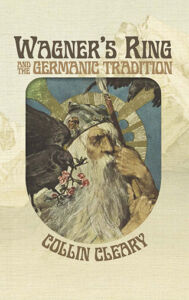
You can buy Collin Cleary’s Wagner’s Ring & the Germanic Tradition here.
OM: Has your festival had problems with the police?
DB: The police are of course very interested in the EHF. They monitor it closely, and every year there is also an intervention unit ready to go. They have already intervened in the area once, when they accompanied an ambulance that was sent for an injured visitor. The policemen, who were armed with submachine guns, formed a circle around the ambulance, and after loading the injured man, they drove off again in peace — all to the sound of the main band of the evening. Many people did not even notice.
Only a few visitors know how close the festival is to the edge and how quickly the whole event can be cancelled . . .
OM: How do the residents of Nýrsko perceive the festival? Do you cooperate with the town on any other cultural events?
DB: The residents of Nýrsko and some of those in the town’s administration perceive the whole festival in a negative light. One year, the local priest celebrated a cleansing mass in the church against the festival organizers, and then went on to consecrate the grounds. The event is nicknamed the “blood festival,“ and locals try not to approach the festival grounds on the day of the event. There was also an attempt to stop the festival.
It is understandable that people who have no idea about Black Metal and the only musicians they have ever seen were painted like Kiss, and then they see some photos from the festival where the musicians were covered in blood, a monk’s throat was cut, a bloody woman was hanging on a cross. They get the impression that madmen from all over Europe are gathering here. So there can be no question of any cooperation. Although on the other hand I have to say that when I organized a reenactment of a medieval battle from 1468 in Nýrsko last year, the town came to my rescue and provided me with land and waste containers. So perhaps the situation has calmed down, and I just hope that in the future everything will be peaceful and mutually tolerant.
OM: Do you know the dark history of your town of Nýrsko?
DB: I am quite interested in the history of Nýrsko. In the Middle Ages there were constant border clashes with Bavaria, with mutual attacks on both sides. It culminated in the Battle of Nýrsko in 1468, during the reign of Jiri z Poděbrad, when the Bavarian army first laid siege to Nýrsko and then burned it down. Then they camped here for about 14 days and organized robbery raids in the surrounding area, especially targeting Jan Racek’s goods. By that time, however, the royal army had already gathered, and together with the local militias from Klatovy and Domažlice they defeated the Bavarians in a bloody battle, and the commander of the German army was killed.
During the Second World War there was fighting with the Americans at the end of the war, and after one Hitler Youth member destroyed an American tank with a Panzerfaust, they retreated and shelled the town with howitzers. During the shelling several people were killed, including when a mother was coming out of church while leading her one-year-old son by the hand and an incoming shell cut off his head.
OM: What would you recommend festival fans to visit the surrounding area?
DB: I would definitely recommend the ruins of Pajrek Castle, which is located about two kilometers from the festival grounds. It has quite a bloody history. It underwent a siege and was burned down several times, as in 1472 by the Bavarians, and lastly during the Thirty Years‘ War by the Swedes. It was also home to a gang of bandits who run amok in the region. Eventually it was liquidated and its leader was executed by beheading in Prague.
Also worth a visit is the nearby town of Klatovy (about 18 kilometers away), where you can visit the Black Tower, a very well-preserved strip of city walls and especially the famous catacombs, where there are lots of mummified monks and piles of coffins — all the cool stuff.
OM: It’s as you write. The big advantage of the EHF is that it’s in Nýrsko, which is on the border of Germany, Austria, and the Czech Republic, so fans from all of these countries can easily come here.
Is there a special German, Austrian, or Czech identity here, or do all these nations leave their identities on the other side of their borders?
DB: I think — and I have seen this in other underground events — that the sole identity that unites us is music. It doesn’t matter where you’re from. We all love this particular kind of music. It‘s a hobby and an obsession for a whole lifetime. That’s why I try to invite bands to come here that have this music in their blood. The festival has a certain negative reputation, and I’m glad for that. The EHF is definitely not a transgender-friendly type of festival.
OM: There are a few similar festivals in Europe, such as Asgardsrei (Ukraine), Hot Shower (Italy), Steel Fest (Finland), and Call of Terror (France). Have you ever visited these festivals, and if so, do you have any memories from them?
DB: I visited Asgardsrei in Kiev twice. Each time there were about 15 of us, and I have incredible memories of this event. We always went a day earlu, and because I wasn’t just drinking and listening to music, I managed to visit a lot of interesting places such as Chernobyl, the Kiev Fortress, military museums, and so on. It was a luxurious event with great sound, and you met a lot of friends from all over the world. This year I am going to Steelfest for the first time and expectations are high.
OM: Have you had any experience with censorship? Due to censorship, the band Kroda couldn’t perform in the United Kingdom at the Darkness Guides Us festival. It is possible to organize such a concert in the Czech Republic? How is the censorship here?
DB: Of course, there is censorship here as well, although on a much smaller scale than in the West. I know which bands can pass and what is totally over the edge. The police have only intervened in the lineup once so far, and that was more of a coincidence given that there are two bands with the same name who come from the same area. One plays Black Metal and the other plays something completely different. It was just a bad coincidence, so I took the band out of the lineup, but before that I discussed and explained everything with the authorities. They had no problem with it, and I replaced that band with another so that there would be no persecution of the other bands and the event could go on. Another time, the German police intervened and arrested the singer of another one of our bands the day before the event and banned him from travelling to the Czech Republic. Everything was resolved by a lawyer and the payment of bail, so the singer was able to visit the Czech Republic for 24 hours.
As far as the other band go, the police sometimes give me a list of songs that are not recommended to be played here, and so on.
OM: Do you have any personal memories of Graveland and Nokturnal Mortum?
DB: Graveland has played here twice before and it was great every time. I love the way Rob can perform live, and he always surrounds himself with top musicians. Personally, he’s a very laid-back guy. Any problem is dealt with calmly and without stress. I remember this band with love.
Basically, except for one band, everything has always gone perfectly, and I got along with everyone without any problems. To this day we still say hello when we meet at gigs, or sometimes we text each other to see what’s new. My best experience in person was with Kaiser from Ad Hominem, who is always great to talk to and a lot of fun.
OM: I’m glad to hear it. Have you had any funny stories with Ad Hominem?
DB: There are some stories. They played three times at the EHF, but most of them are unpublishable.
OM: What beer specials will there be at this year’s festival? Are you a craft beer lover? What small breweries would you recommend to international visitors?
DB: Beer specials are sold in limited quantities at the festival, but the offer will surely expand. But this is something I am not in charge of, so I can’t influence it. The main beers here are Holba and Pilsner Urquell. Otherwise, I also prefer a craft beer, but here at the festival I haven’t even had the time to taste it yet, because I don’t drink the entire day — only when all the bands have finished playing and I’m all paid up. Then I’ll have something, but it’s usually Russian Standard, or the alien octopus Kraken [rum].
OM: You should have the last word. What would you like to tell our foreign readers? And thanks for the interview.
DB: Thank you very much for the interview and the opportunity to introduce this underground festival to international readers. First of all, thank you to all those fans who don’t hesitate to travel long distances from almost all over Europe to attend this event. Without your support, this festival would not exist anymore.

